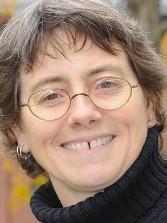News
From the newsletter: Decoding digital humanities, part III
Digital humanities originated in rooms occupied by giant computers, Claire Potter CN ’87 notes, and the questions raised and practices developed by scholars in early humanities computing laid the groundwork for the field today. Now, in a world where people have access to a wealth of knowledge in the palms of their hands, she considers the heart of digital humanities to be “using technology to reconceptualize the design of typical humanities research problems—creating large data, grappling with large data, visualizing knowledge, and using computers to ask new kinds of questions.”
 Dr. Potter, a professor of history and chair of the Digital Humanities Initiative at The New School, found her way into the digital humanities partly because of her popular blog “Tenured Radical,” which she started in 2007. (It was subsequently picked up and published by The Chronicle of Higher Education from 2011 until earlier this year.) She says she was pulled into the field: The more active she became in the digital space, the more she began to ponder questions of scholarship, daily practice, and pedagogy for humanists working with technology.
Dr. Potter, a professor of history and chair of the Digital Humanities Initiative at The New School, found her way into the digital humanities partly because of her popular blog “Tenured Radical,” which she started in 2007. (It was subsequently picked up and published by The Chronicle of Higher Education from 2011 until earlier this year.) She says she was pulled into the field: The more active she became in the digital space, the more she began to ponder questions of scholarship, daily practice, and pedagogy for humanists working with technology.
Particularly in working with recent history, Dr. Potter observes, the vast proliferation of sources and the fact that archives are increasingly born digital have direct impacts on how data is researched, studied, and distributed. “The sheer volume of documents both electronic and paper generated by a given institution or community organization is so huge,” she says. “You really need new ways of understanding them, mapping them, and making them visual for people to understand.”
Information distribution is not a new hurdle in the humanities, where direct access to original texts and materials can be crucial, but adding a digital element at once opens new opportunities and presents new questions. Dr. Potter thinks of these new approaches as she works with OutHistory.org, an online catalogue of LGBT research and history. One advantage of the website: It enables users to submit pieces of daily life that might otherwise be excluded from a traditional archive. “That kind of daily archive of LGBT life actually becomes very important in writing history.”
In an attempt to expand conversations about the impact of digital technology on pedagogy and learning, Dr. Potter is working on a program called Digital Across the Curriculum, which aims to put at least one digital assignment into every classroom. She hopes the program will be “a way of helping faculty and students develop better digital skills and thinking about how those skills translate into the classroom.”
Dr. Potter’s next book, Digital U: Why Crowdsourcing Social Media, Word Press and Google Hangouts Could Save the Humanities (University of North Carolina Press), will go through a fitting round of “crowd refereeing”—an outgrowth of the online practice of crowdsourcing. The full book will be posted in draft for eight months and interested viewers can comment, question, and contribute to the manuscript.
Digital work, Dr. Potter explains, has great power for moving the humanities out into the world. “The humanities are bridge-building,” she says. “They become a way for committed people in the university to fan out into communities and to give communities a kind of access to the conversations that we in the university take for granted.”
###
This story appeared in the fall issue of Fellowship, the newsletter of the Woodrow Wilson Foundation, in a section titled Decoding Digital Humanities: Perspectives on an emerging and ever-changing field. To see the full newsletter, click here.


